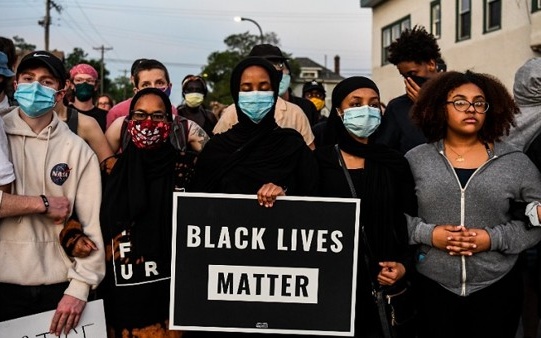Protestors gather near the makeshift memorial in honor of George Floyd, one week after his murder in Minneapolis, Minnesota, June 1, 2020 (Chandan Khanna/AFP/Getty)
Joe Biden, the presumptive Democratic nominee for President, calls for leadership and responsibility as nationwide protests continue after the murder of George Floyd at the hands of police in Minnesota.
In a speech in Philadelphia on Tuesday, Biden called for an engagement of racial issues, including police violence, without the “selfishness and fear” marking the 40 months of the Trump Administration.
Biden spoke a day after Trump’s threat of military force and a photo-opportunity walk from the White House across the street to St. John’s church. Just before the statement and walk, Attorney General William Barr ordered military and police personnel to clear peaceful protesters from Lafayette Park, using tear gas, rubber bullets, and riot-control munitions.
See also EA on Pat Kenny Show: Decent Protests to Counter Trump’s Threats
TrumpWatch, Day 1,229: Trump Threatens Military Force to “Dominate” Floyd Protests, Poses at a Church
Biden offered the contrast of addressing the “fear and uncertainty in the country…after generation after generation after generation of hurt inflicted on people of color”:
I won’t traffic in fear and division. I won’t fan the flames of hate. I’ll seek to heal the racial wounds that have long plagued our country, not use them for political gain. I’ll do my job and I’ll take responsibility — I won’t blame others.
Biden called on Congress to make a “down payment” on the “work of a generation” to banish systemic racism, including the launch of a national police oversight board: “It’s time to pass legislation that will give true meaning to our constitutional promise of legal protection under the law.”
He continued with the message to all Americans: “Look at where we are now and think anew: Is this who we are? Is this who we want to be? Is this what we want to pass on to our children and grandchildren — fear, anger, finger-pointing, rather than the pursuit of happiness? Incompetence and anxiety, self-absorption, selfishness?
Or do we want to be the America we know we can be, the America we know in our hearts we could be and should be?
See also The Floyd Protests: “This Moment Can Be A Real Turning Point”
Amid the Coronavirus pandemic, Biden has been in his Delaware home since mid-March, soon after taking an overwhelming lead in the Democratic race for the White House. He had been limited to statements and TV interviews from the residence, but he made his first public appearance on Memorial Day, at a ceremony at a nearby cemetery.
Trump tried to mock Biden for following White House medical guidance and wearing a mask. But on the same day, May 25, the political situation shifted with the video of police officer Derek Chauvin kneeling on George Floyd’s neck for almost nine minutes.
“A Wake-Up Call for Our Nation”
Biden spoke with Floyd’s family last weekend and visited the site of a protest in his hometown of Wilmington, Delaware.
On Monday, as Trump told governors that they were “weak” if they did not use force against protests — “They are gonna run over you, you’re going to look like a bunch of jerks” — Biden met with African American community leaders in Wilmington and had a virtual roundtable with the mayors Atlanta, Chicago, Los Angeles, and St. Paul, Minnesota.
Biden said on Tuesday that Floyd’s murder is “a wake-up call for our nation”:
“I can’t breathe. I can’t breathe.” George Floyd’s last words. But they didn’t die with him. They’re still being heard. They’re echoing across this nation.
They speak to a nation where too often just the color of your skin puts your life at risk. They speak to a nation where more than 100,000 people have lost their lives to a virus and 40 million Americans have filed for unemployment — with a disproportionate number of these deaths and job losses concentrated in the black and minority communities.
And they speak to a nation where every day millions of people — not at the moment of losing their life — but in the course of living their life — are saying to themselves, “I can’t breathe.”

